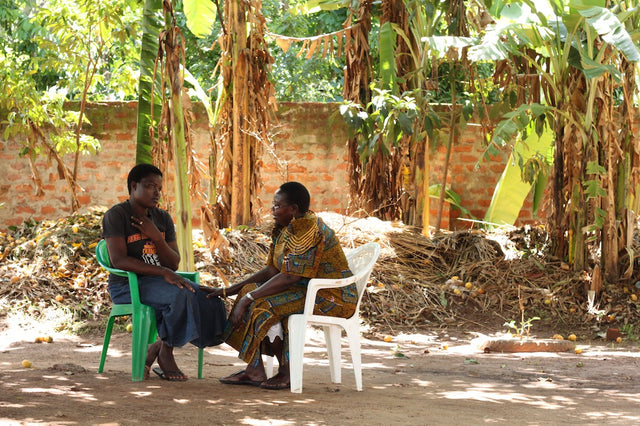Empowerment: Mentorship
MENTORSHIP
The vision for Krochet Kids intl. programs is not to employ individuals for decades, but rather to empower women to create locally sustainable jobs that eventually earn them more money than they currently earn crocheting and knitting hats. Our goal is for a beneficiary to come to our staff and say, “See you later! I can make more money doing my other job. Thanks for the help.” At this point we’ve completed our mission.
As explained in my previous post, a job is a key component to this goal. It equips our beneficiaries with the resources to make drastic changes in their lives. But while our ladies have incredible dreams and plans for their family’s future, the process of meeting them can be very difficult to navigate. This difficulty mostly comes from not trusting themselves and/or not having had the opportunity to think this way. Regardless of its source, it is important that we support them with relevant and consistent training and mentorship that helps show the way out. To use a metaphor: we can put people in the driver’s seat of development and fill the gas tank with as many resources as we want, but if we aren’t there to help give directions, it will be really hard for our beneficiaries to get to their final destination.
In 2009 we developed and implemented an initiative to support our beneficiaries as they walk through the process of ending poverty in their lives. We call it the Mentorship Initiative and are finding that it is accelerating life-change in amazing ways. In this post I’ll be briefly explaining how it works and some of the reasons why it is a revolutionary approach to supporting the empowerment process.
Mentorship briefly explained: The mentorship program is designed to build the capacity of our beneficiaries throughout the program. It’s a combination of group training and one-on-one mentorship that expands on the following topics over the course of 3 years: personal budgeting, savings and loaning practices and business development. These are areas that we find directly correspond with the beneficiaries’ personal development as they get used to having an income and learn how to channel it to make decisions that benefit them in the future.
The Mentorship Initiative is made up of local community development leaders that find purpose in seeing their neighbors rise above poverty. Each of our staff possesses a wealth of knowledge and experience in a particular area of community development, whether it be finance, literacy, business development or psychological care.

(Program Mentor Lawil Langol Christine leading a training on business)
Here’s how the process works: Weekly, our Program Director provides a group training session that corresponds with our training curriculum. After the group meeting our mentors follow up with their mentees to help contextualize the training topic down to each unique individual. Each mentor has no more than 20 beneficiaries in their group, which ensures that they are able to meet with each person on a weekly basis. During these meetings, the two work through questions and concerns that the beneficiary has regarding the week’s training topic.
After implementing the Mentorship Initiative in 2009 we saw a drastic increase in the change the beneficiaries were creating in their lives. In the remainder of the post I’ll explain that this happens because we are creating one-on-one learning opportunities, building direct relationships that allow for contextual and progressive aid, and fostering an environment in which local leaders are in charge of helping their community.
One-on-One learning opportunities: Giving our beneficiaries the opportunity to relate one-on-one with their mentor has helped ensure that the information we train on is retained and put into practice. Given the complexities of each individual’s life, it is impossible that our training sessions will immediately be meaningful to each beneficiary. What is happening in Adele’s life at any given time is probably much different than what’s going on in Jacque’s life (considering that she is 20 years younger). These one-on-one meetings are crucial to ensuring that our beneficiaries have the opportunity to clarify any questions or concerns that may get in the way of utilizing the principals that are taught. To look at it from another angle, these meeting allow our mentors to monitor the progress of our capacity development goals. If the majority of the beneficiaries are struggling with the training topic of the week we know we need to go back and revisit our delivery and content strategy. We are serious when we say that our success doesn’t come when we give training, but when the principals are retained and applied.
Relationships are key: We pride ourselves in building strong relationships with the women we work with. It has been a part of our organizational DNA from the beginning, but developmentally it works to our advantage because it ensures that our efforts are both contextual and building. As our staff develops friendships with their mentees they are able to contextualize the trainings down to each individual because they know what’s going on in their life. They offer advice that is relevant and applicable. Even more, our mentors develop unique training styles for each of their mentees, leading to a more valuable and efficient process.
Relationships also allow our aid to be progressive. Our mentors commit to being with their mentees for the whole time they are in a Krochet Kids program and therefore are deeply involved in each individual’s process of leaving poverty. These intimate relationships allow them to consistently build upon previous conversations and successes. Not only does this more holistically support the empowerment process, but it also equates to greater efficiency because we don’t have to spend time getting to know our beneficiaries time and time again.

(Program Mentor Amony Susan with Akot Beatrice)
Ugandans helping Ugandans: Most supporters of grassroots development believe it is so successful because ideas are developed from the bottom up. It doesn’t take a rocket scientist to know that Ugandans or Peruvians have the best understanding of what life is like in their country. And equally, they have the best understanding of what it takes to end poverty in their own backyard. Sadly, most programs are designed around ideas that have worked other places and are then imported.
I believe that one of the greatest contributors to the success of our projects is that we build up strong and visionary local leadership that direct and implement our program activity. In each program site we have a Board of Directors made up of NGO, business and education professionals that develop the program curriculum and monitor and evaluate it’s successes and shortcomings. They are also in charge of staffing our mentorship team with well-qualified and driven individuals. We are very proud of the fact that at every level of the organization, locals are in control of the development process. The ladies are in charge of their own personal development, the mentorship team assists them through the empowerment process, and the Board of Directors develop and maintain the program activity. The entire process is driven by local leadership and knowledge which ensures that we are relevant to the communities we work in.
If you made it this far in the post you are awesome…
Believe it or not, this is a very condensed explanation of what our Mentorship Initiative is and why it is changing lives. While it sounds complex it’s really just a methodology of LOVE. We believe that it is only through strong relationships with the women and communities we work in that we can help create sustainable change. We saw the benefit of this when there were only ten ladies working for KKi and we are committed to maintaining this value as we grow to work with thousands.
In my next blog post I’ll be sharing how the combination of a job and mentorship is changing the face of Northern Uganda. You may be reading this and saying, “This all sounds great, but where’s the proof?!” Well in a few weeks I’ll be sharing the proof that we’ve been gathering over the last couple years. Can’t wait to share!
- Adam Thomson, Intl. Programs Director
Next Post:
MONITORING & EVALUATION




0 Comments
There are no comments yet. Be the first one to post one!